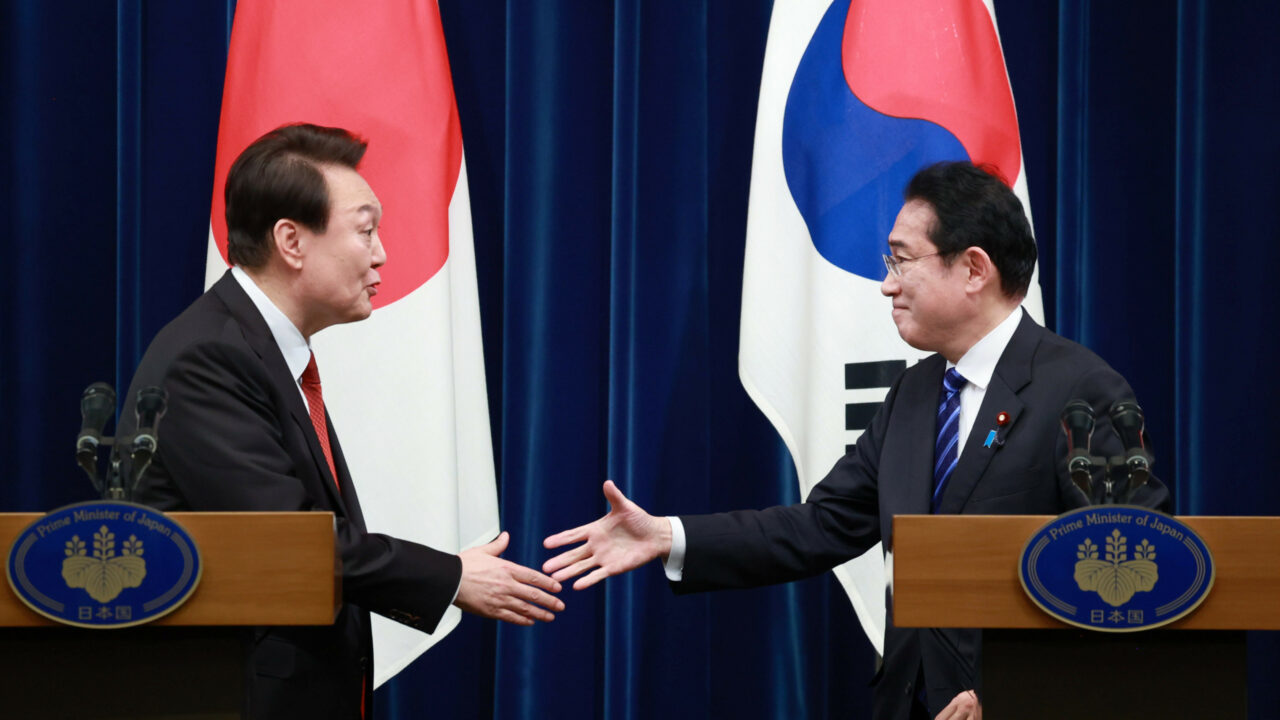The weight of history: Why the recent thaw in South Korea-Japan relations may not last
A recent thaw in ties between the EU’s two most important partners in East Asia is a potential game-changer for a region fraught with geopolitical danger – but complex domestic politics in both countries may yet derail a truly long-lasting rapprochement
In March, Japan and South Korea held their first bilateral summit for 12 years. The meeting broke a diplomatic deadlock between the countries that had endured since their already-strained ties deteriorated in 2018, following a dispute over colonial-era reparations. Progress on resolving this dispute was fundamental to the recent thaw in relations. But the parties also found common ground on key external factors: namely, intensifying nuclear and missile threats from North Korea, as well as concerns regarding China’s challenges to the rules-based regional order.
Stable relations between the neighbours could increase the chances of counterbalancing China’s practices and its destabilisation of the Indo-Pacific region, such as in the East and South China Sea and the Taiwan Strait. Indeed, the two powerful economies and technological leaders – both key security allies of the United States – have much in common in their strategic thinking. South Korea’s first comprehensive Indo-Pacific strategy and Japan’s “Free and Open” Indo-Pacific strategy, as well as the latter’s new national security strategy, make clear that the countries not only share an assessment of the severity of geopolitical risks but also a commitment to proactively engage in the security of the rules-based order in the Indo-Pacific. This underlines the great potential for joint Japanese-Korean action to foster stability in the region and build a strong bloc against China’s policies, not only around security but particularly in the field of critical and emerging technologies – which could truly be a game changer in regional geopolitics.
In light of its own ambitions in the Indo-Pacific, it is in the strong interest of the European Union to encourage the rapprochement process. But, for this to succeed, EU leaders will need to appreciate the historical complexities of the delicate truce and the complex domestic political landscapes in both countries.
The worsening external environment was significant, but the real door-opener for the summit was a crucial policy turnaround by South Korea’s new conservative government on reparations. In early March, President Yoon Suk-yeol announced a plan to settle this longstanding historical dispute and compensate victims of Japan’s forced labour during the final years of its colonisation of the Korean peninsula – funded solely by Korean companies. In doing so, the government unilaterally offered a solution to a legal deadlock caused by a 2018 Korean Supreme Court ruling that ordered several Japanese companies to individually compensate victims, threatening to seize their Korean assets if they refused.
This was highly contentious in Japan since, from its point of view, all reparations had been settled by the normalisation treaty of 1965. The Korean ruling precipitated an all-time low in relations between the countries. The Japanese government issued export controls on certain key goods for South Korea’s important semiconductor industry. It also removed South Korea from its export ‘whitelist’ of countries with expedited trade status. South Korea, in turn, removed Japan from its own whitelist, filed a complaint with the WTO, and threatened to terminate the important “GSOMIA” military intelligence-sharing pact.
The recent summit effectively normalised relations, reversing all these measures. The parties also agreed to resume key ministerial security dialogues and restart bilateral strategic talks between vice foreign ministers. Moreover, both Tokyo and Seoul stressed the need to further strengthen their “deterrence and response capabilities”, bilaterally and within the US alliance system.
Kishida has now invited Yoon to the next G7 meeting in Hiroshima, underlining the realisation that the current economic and security challenges can be better faced together
There are also clear signs of the parties’ willingness to stabilise relations beyond the summit. Japan’s prime minister Fumio Kishida and the Korean president, for example, committed to resume so-called shuttle diplomacy – regular personal meetings in Seoul and Tokyo, which have not taken place for more than a decade. And, more importantly perhaps, they have expressed their willingness to expand cooperation in key political and economic areas, including liquefied natural gas procurement, semiconductor supply chains, biotechnology, infrastructure, and space. Kishida has now invited Yoon to the next G7 meeting in Hiroshima, underlining the realisation that the current economic and security challenges can be better faced together.
However, the sustainability of this promising normalisation of relations remains far from certain.
The Japanese government had long insisted that for bilateral ties to improve and trust to be rebuilt, South Korea would have to make concessions and come up with an acceptable solution to the forced labour reparation issue. The recent and rapid diplomatic breakthrough would therefore not have been possible without Yoon’s willingness to pay a sizeable domestic political price. One recent poll found that almost 60 per cent of South Koreans oppose the suggested resolution – citing concerns about dropped demands for guaranteed Japanese contributions and a formal Japanese apology. Tellingly, Yoon’s approval ratings have fallen from 36 per cent to 30 per cent over the past month, with “diplomacy” and “Japanese relations” the main reasons for negative responses.
Yoon’s opponents in the liberal Democratic party have wasted no time in trying to exploit this polarisation and the Korean people’s historical grievances with Japan for political gain. And liberal newspapers and Korean civil society also share a view that Yoon’s approach entails a unilateral Korean concession that went largely unreciprocated by the Japanese side. Ahead of a crucial legislative election next year, Yoon may soon find himself pressed to change course in pursuit of winning back a parliamentary majority.
Larger conciliatory gestures from Kishida would make it easier for Yoon to sell his plan to the Korean people. But Japanese political discourse is imbued with a profound sense of distrust of Korean politics. Korea’s president from 2017-2022 Moon Jae-in, for example, unilaterally walked back on an agreement between his predecessor Park Geun-hye and Japan’s former prime minister Shinzo Abe, which aimed to resolve the WWII-era “comfort women” issue of sexual enslavement. This compounded other past policy reversals and historical tensions, contributing to a strong sense in Japan that nothing Tokyo does will be enough to satisfy South Korea.
Hence, the Japanese government was initially sceptical about the seriousness of Korea’s most recent overture, fearing that any agreement could be rendered meaningless again as soon as the ruling party in Korea changes or public pressure becomes too intense. Kishida also faces strong pressure from conservative nationalist factions within his party, who categorically reject any concessions on historical issues and are well known for their historical revisionism and denialism. Kishida is dependent on the support of these factions for political survival. He will therefore need to align with longstanding party policy that historical issues have been settled, meaning it will be very difficult to make the kinds of concessions that could help bring the Korean public around. Without that reciprocity, however, the current deal – even if it boosts economic and security ties in the short term – could meet the same fate as those that came before it.
Yet, although alignment on security issues was not sufficient in the past to overcome the weight of history, the sheer speed and scope of change in the current economic and security landscape could lend a degree of insulation from domestic pressures. European leaders should grasp this opportunity. The EU has declared Japan and South Korea key allies in the Indo-Pacific region; it should therefore support the parties in any bilateral initiatives as they seek to shift the geopolitical scales in their favour. Europeans could also carefully probe opportunities for trilateral cooperation in areas with the highest potential for synergies, for example in aligning the approaches of the Digital Partnership Agreements the EU has with both countries.
Moreover, Europeans should encourage initiatives to integrate both countries into structures through which they can jointly assume responsibility for the entire region, for example the addition of South Korea to the Quadrilateral Security Dialogue between Japan, Australia, India, and the US. Such long-term collaboration with other partners could help limit drastic policy reversals following changes in government. The EU could also use its diplomatic capabilities to support Japan and South Korea in their joint efforts to cooperate more with NATO, which would benefit both the European and Indo-Pacific strategic theatres.
Even under the current circumstances, however, a truly sustainable rapprochement will only be possible if both Yoon and Kishida show bold political leadership and manage to convince their publics of the severity of the external challenges – and that the benefits of a good relationship are worth more than lingering historical pride.
The European Council on Foreign Relations does not take collective positions. ECFR publications only represent the views of their individual authors.



